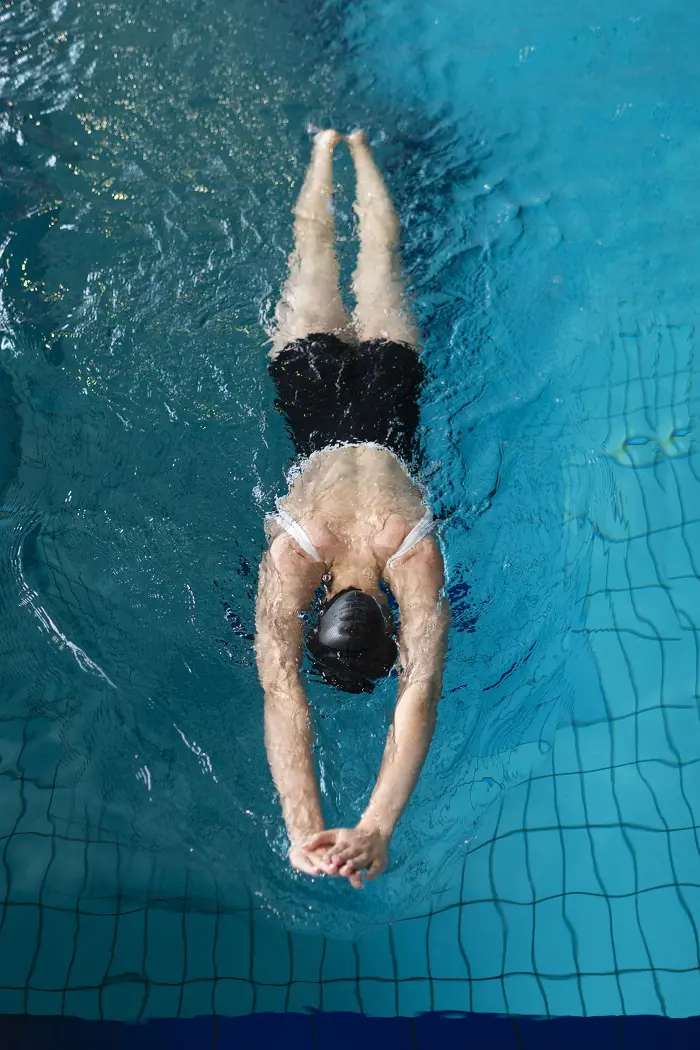15 Remarkable Health Benefits Of Swimming

Regarded as the 4th most popular sport in the USA, swimming is a fun way to stay physically and mentally fit. It’s a low-impact activity suitable for people of all age groups.
Including this exercise in your routine can bring numerous advantages, like burning calories and boosting muscle strength. So, let’s uncover 15 remarkable health benefits of swimming that are sure to amaze you:
1. Engages The Whole Body

The major health benefit of swimming is that it engages a wide range of muscle groups, including the core, shoulders, hips, and legs. This makes it a key addition to our full body stretching routine.
We can utilize various swimming techniques like backstroke, breaststroke, butterfly, and freestyle. These techniques breaks the monotony and are fantastic for working our body muscles in different ways.
2. Promotes Cardiovascular Health

The second swimming benefit that might get us jumping in pool is the exercise's positive impact on our heart. As a cardio workout, regular swimming sessions could lower blood pressure, improve cholesterol levels, and reduce the probability of heart disease.
Swim England commissioned a report in 2017 to highlight this water sport’s aid to our cardiovascular system. It found that swimmers experienced a 41% lower risk of heart disease compared to non swimmers.
3. Helps In Weight Loss

Being a full body workout that activates multiple muscle groups, swimming is a fantastic way to torch calories and lessen fat. That's why, it's known as a great exercise that burns the most calories. For instance, an individual who performs a breaststroke can burn 200 calories by swimming for 30 minutes.
Meanwhile, a swimmer who performs the butterfly stroke for 30 minutes may actually torch a whopping 450 calories. It’s important to note that the butterfly stroke is relatively hard, and is not suitable for beginners. An hour of doing this cardio exercise can burn up to 800+ calories.
4. Manages Stress

If you’re feeling mentally stressed from work or school, try taking some swimming classes to cool off. Enjoying time in the pool allows the calming effects of water to soothe the body by reducing muscle tension and increasing heart rate, helping us forget our daily life’s tension.
The rhythmic movement involved in swimming might also trigger the release of endorphins, a natural anti-stress hormone.
A study published by International Journal of Stress Management in 2021 also found that people who indulge in regular swimming saw reduced stress hormones, i.e. cortisol.
5. Develops Muscle Strength

Since this physical activity features natural resistance against water, it can be regarded as a wonderful method for developing strong muscles. Moreover, since water is more resistant than air, swimming can be a more beneficial muscle builder compared to other cardio workouts like running.
By engaging the whole body, we can target our core, legs, shoulders, and back muscles all at once. Over time, this leads to increased muscle toning, making swimming a great alternative to gym routines.
6. Improves Our Sleep

The next advantage of swimming is that it can improve our sleep at night. This activity relaxes the mind and tires out the body, helping us drift into sleep more quickly. Moreover, the cooling effect of a swim lowers our core temperature, telling the body that it’s time to rest.
A study published by Sleep Medicine Journal in October 2010 found that older people with insomnia had a better quality of sleep after participating in daily aerobic exercises (which includes swimming).
7. Great For People With Asthma
Swimming involves a variety of breathing techniques that help you enjoy the activity safely. Holding your breath at the right moments, along with deep inhaling and exhaling with each stroke, can all contribute to expanding lung capacity. This increase in lung capacity may be quite helpful for an asthma patient.
The humid environment around the pool also supports better respiratory function. Since humid air is less irritating than dry air, it might be especially beneficial for those with asthma. However, make sure the pool doesn’t contain too many chemicals / disinfectants.
8. Relieves Joint Pain

This water-based activity is low-impact compared to exercises like running and cycling. The buoyancy of water supports our weight, making it gentler on the joints.
At the same time, the water’s light resistance encourages the elbow and knee joints to work a bit harder, helping us build strength in these areas.
This benefit is especially helpful for those with arthritis, as it can reduce joint pain and promote speedy healing. Regular swimming classes may significantly reduce arthritis symptoms, particularly inflammation.
9. Enhances Mood

When we enjoy a good swim, it can help boost our mood and free us from earlier negative thoughts. Doing this exercise for 30 minutes to an hour could elevate our mood by increasing endorphin production.
Since swimming relaxes both body and mind, it naturally lifts our spirits. This makes our day better, strengthens our mental health, and fills us with positive vibes when we interact with other individuals.
10. Builds Endurance

With each stroke, we are using our heart and lungs to keep swimming. These two organs work together to overcome water resistance and keep us moving forward. Hence, by doing this exercise consistently, we could boost the function of these organs, ultimately enhancing our stamina.
As lung capacity increases and the heart muscles grow stronger, we’ll start to feel less tired and able to perform physical tasks for longer periods of time.
11. Improves Cognitive Function

This cardio workout is also beneficial for brain health, particularly in improving memory, reasoning, and attention. One of the primary reasons is due to its power to pump more blood and oxygen throughout the body, including the brain.
Likewise, consistently swimming may also promote neurogenesis, aka the formation of new neurons. This is especially important in hippocampus, the part of brain responsible for memory.
Physiological Reports Journal also published a report in October 2019 showing that swimming assisted in increasing cognitive function in young adults.
12. Offers Relief For Pregnant Women

Although it may seem counterproductive to swim during pregnancy, it’s actually quite beneficial. Swimming gently can help a pregnant woman calm her mind and reduce stress in her hips, back, and legs. The weightlessness of water could be especially helpful in easing back pain.
By improving blood flow, swimming can decrease the risk of swelling and varicose veins during pregnancy. Moreover, taking swimming classes during early to mid-pregnancy may reduce the risk of congenital birth defects and preterm labor.
13. Improves Posture And Spinal Health

Improved body posture and stronger muscles around the spine are some underrated benefits from swimming sessions. Techniques like freestyle and backstroke engage the back and core muscles effectively, which can strengthen those areas over time.
However, it’s crucial to understand the correct form for each technique before diving into them in the pool. So, why is proper form important? Since these techniques focus on symmetrical movements, uneven weight distribution can actually harm posture.
14. Promotes Healthy Bones

If we're suffering from bone-related problems like osteoporosis, swimming may be a wonderful exercise to improve bone density and ultimately strengthen it. It’s low-impact too, so it won’t put too much stress on our joints, making it a big relief for osteoporosis patients.
Still, the resistance provided by water isn’t as effective compared to weight-bearing workouts like running and weightlifting. So, it’s best to combine swimming with these weight-bearing activities in our weekly routine.
15. Affordable And Fun

At the end of the day, swimming is a fun activity enjoyed by the majority of people during the summer. And who can blame them? When we jump into the pool, we get refreshed by the cool water, and when we combine that feeling with friends and family, it becomes a social pastime.
It’s also an affordable way to socialize and have fun, unlike many other recreational activities. Many swimming venues in the United States charge reasonable fees. Plus, kids can enjoy pool workouts at their schools on hot days for free.
Safety Tips For Swimming
Although considered a safe activity for both kids and adults, it can still be dangerous for beginners who aren’t accustomed to floating properly in water. Jumping into the pool without understanding safety tips can put your life at risk.
So, here are some essential tips to keep in mind:
1. Visit The Pool With A Partner
If you don’t know how to swim properly, then swimming alone may be the most unsafe decision you can take. There is a chance of drowning, which can even lead to death. Hence, take a partner with you while swimming so that you can have each other’s back.
2. Enter With The Feet First
If you’re a beginner, an important tip before entering the pool is to take it easy: enter with your foot first. Diving headfirst can be reckless since you might be plunging into a deeper area of the pool, which can quickly lead to drowning, especially if you're just at a learning stage.
3. Only Swim In Designated Areas
Remember to swim only in designated areas. This tip is especially important for beginners to ensure they do not venture into deeper parts of the pool or go swimming in lakes and the ocean.
4. Wear Sunscreen In Outdoor Environment
Outdoor swimming can pose a problem for your delicate skin since your whole body is exposed for a long time. Be sure to apply quality sunscreen before jumping into the pool.
If you want to be extra cautious, attempt to avoid swimming during the afternoon, specifically between 11 AM and 2 PM, when the sun is usually at its peak.
5. Drink Plenty Of Water
Bringing water to the swimming pool is essential for hydrating ourselves between sessions. This physical activity is a full-body workout that engages various muscles, so our bodies can quickly lose water in the body.
Neglecting hydration might result in dehydration. Hence, it is crucial to drink plenty of water to avoid dehydration and keep ourselves healthy.
How Long Can We Swim To Get The Benefits?
Per American College of Sports Medicine, 150 minutes of aerobic exercise per week is ideal for maintaining overall well-being. This averages out to about 20-21 minutes of swimming per day.
However, it’s not necessary for individuals to stick to a strict 20 minutes of swimming every day. They can take 2-3 days off and, if they want, spend an hour swimming on weekends. Alternatively, they could swim only on Sunday and conduct other aerobic exercises on other days.
Ultimately, it’s better to exercise than to not exercise at all. Participating, even for a short time, is more helpful than just sitting idly. Whenever you find some time in the morning or evening, try to fit in some cardio workouts to receive various benefits for well-being.
Disclaimer: The content presented in this article is only intended to be used for information purposes. It should not be taken as a form of medical / clinical advice.
Recent posts
Fitness
Fitness
11 Bicep Tendonitis Exercises And Stretches To Try At Home
If there’s inflammation in the bicep tendon, it could lead to a condition called bicep tendonitis. During this condition, we may experience pain in the upper arm and shoulder. The pain can restrict our mobility, and our day-to-day tasks will be...
Fitness
What Is Water Fasting? Benefits And Risks
Water fasting involves total abstinence from food intake and drinking only water for a set period. Typically, it lasts between 24 and 72 hours and has been practiced for thousands of years. People often try to fast with water for multiple reasons, su...
Fitness
What Is Barre Exercises? 10 Workouts At Home
Barre refers to the low-impact, dynamic workouts that combine postures from ballet, pilates, strength training, and yoga. It was developed in 1959 by a dancer named Lotte Berk. These exercises include isometric holds - where we maintain a position fo...
Fitness
10 Tricep Stretches To Relax Your Tight Upper Arms
Stretching the triceps is a great way to ease tightness in the back of the upper arm. Gentle stretches can help improve range of motion and keep unnecessary strains at bay. Strong, healthy triceps are also key for proper elbow extension and shoulder ...
Fitness
20+ Amazing Health Benefits of Cycling
Cycling, a low-impact cardio workout, offers several amazing health benefits that promote both physical and mental well-being. It helps shape a healthy lifestyle. This physical activity enhances cardiovascular health, builds muscle, and even boosts e...
Fitness
20 Amazing Health Benefits Of Regular Exercise
Including exercises in your daily routine keeps you physically active and healthy. With several options to choose from, it offers an enjoyable path to well-being without getting bored. Exercise reduces the risk of chronic diseases, promotes mental cl...






